How To Get Your Period Early: 12 Natural Remedies To Try
Smart ideas for getting your period early without having to cancel a scheduled party or vacation.
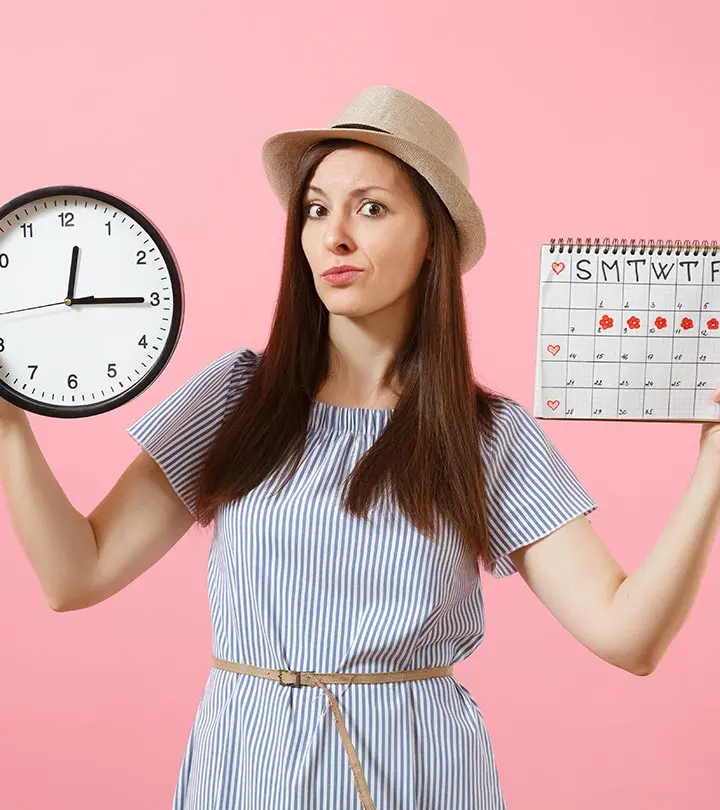
Image: Shutterstock
We can say that very few ladies look forward to their periods every month. If you have a vacation planned or an amazing party to attend during your period, it can surely make your life painful and annoying. To avoid all this, there are a few simple tips you can try to get your period early. If you thought of canceling your party or vacation and sitting at home with a tub of ice cream, don’t worry. While there is limited evidence on how much these tips work, this article takes you through some natural remedies you can try to get your periods early.
In This Article
Why Is My Period So Late?
Women mostly complain about getting their period late. It can make you doubt that you might be pregnant. However, you can get your period late or miss it for reasons not necessarily related to pregnancy. These causes can range from hormonal imbalance to underlying conditions.
Hormonal changes and conditions such as PCOS, stress, excess weight, thyroid disorders, etc. can be the cause of a late menstrual cycle.
Usually, a woman has irregular periods when she begins her first cycle, and when she reaches menopause. Around both these times, it is relatively normal to have an irregular cycle.
Let us now see what causes an early onset of periods.
Key Takeaways
- Eating papaya, and pineapple or drinking carrot juice may help induce premature menstruation.
- Curcumin in turmeric may help to stimulate the blood flow from the uterus, to induce an early period.
- Parsley is a rich source of bioactive compounds that may help in increasing estrogenic activity in the body.
- Certain bioactive compounds in sesame seeds may induce and regularize the menstrual flow
- Drinking a mixture of water and fennel seeds may help menstruation.
What Causes Your Period To Start Early?
It is considered fairly normal if you get an early bleeding once in a while. But if you get an early period regularly, you might have to consult your doctor.
A woman’s menstrual cycle can be affected by factors such as a change in lifestyle, intense workout, stress, or any other underlying conditions. Sometimes, none of these causes might be contributing to early menstruation. In such cases, medical intervention is advised.
The major causes of an early period include:
- Imbalance In Hormone Levels: The menstrual cycle is governed by changes in the level of hormones in your body. However, if there is an undesirable change in these levels owing to birth control pills, you can get your period early.
- Menopause: As you approach menopause, you will have an irregular period that lasts for fewer days than usual.
- Poor Diet: Lack of a balanced diet can directly affect the regularity of your menstrual cycle.
- Medication: Medication like birth control pills or an emergency contraception drug may cause an early flow as it affects the level of hormones in your body.
- Intense Workout: An intense workout affects your menstrual cycle when the number of calories burned exceeds what you have eaten. If your body doesn’t have the energy it needs, it cannot produce the right amount of reproductive hormones needed to ovulate.
- Stress: Stress can also cause your period to come earlier as it can interfere with the normal levels of hormones in your body.
 Quick Tip
Quick TipLet us now look at the factors that put you at risk of getting an early menstrual cycle.
Risk Factors
Women who have an early period effectively have two periods in a month. Following are the factors that can increase your risk of getting an early discharge:
- A family history of cysts, fibroids, or early menopause can make you susceptible to an early period.
- Lower abdominal pain that lasts for a few days
- Heavy flow during periods
- Pain during intercourse
How can you tell if your period is coming? Look out for the following symptoms.
Symptoms Your Period Is Coming
- Abdominal Cramps
Abdominal cramps are caused by contractions in the uterine wall, and this is called dysmenorrhea.
It usually starts in the days leading to your period and can last throughout your cycle. Some women do not feel these cramps at all, while others feel a high-intensity pain that can hamper all their activities.
Cramps originate in the lower abdomen and can travel all the way down to your thighs and up to your mid-back.
Sometimes, cramps can be associated with conditions like pelvic inflammatory disease, fibroid, endometriosisi A disorder in which cells similar to the lining of the uterus grow outside of it, causing severe pain and infertility. , etc. In such cases, the pain can be more intense. These cramps are known as secondary dysmenorrhea.
- Breakouts
Breakouts are common as you approach your cycle. This is because, as you near your period, your body undergoes hormonal changes. This causes the appearance of acne, pimples, or zits on your face, neck, or back.
- Tender Breasts
During the first and second halves of menstrual cycles, your body releases estrogen and progesterone respectively. Around ovulation, when the level of progesterone increases, your breasts enlarge and can feel tender, lumpy, and swollen. For some women, these symptoms can be very mild, while they can cause a lot of discomfort in others.
- Bloating
Hormonal changes near your period can cause bloating. This bloating can be attributed to increased retention of water and salt in your body.
- Bowel Issues
Bowel movement is susceptible to hormonal changes. You may experience the following problems as you near your period: nausea, flatulence, diarrhea, or constipation.
You are most likely to feel nauseous or constipated as you get closer to your date.
- Headache
When you are nearing your period, estrogen levels in your body rise. This can trigger the increase in serotonin that can set off migraines and headaches. This can cause migraines in women who are prone to headaches.
- Mood Swings
We are all well aware of the emotional symptoms of PMSi A combination of signs and symptoms that occur in many women about a week or two before their period. . These include mood swings, anxiety, irritability, and depression. The hormonal changes are responsible for this.
A survey conducted among 2000 healthy women revealed that 38% of them always undergo mood changes around or during their periods and 43% of women sometimes undergo mood changes. Additionally, half of the women face food cravings, breast tenderness, headaches and one third of them have fatigue, bloating, and cramps. So such symptoms indicate your periods are coming.
 Quick Tip
Quick TipWhile having an early period once in a while is fine, if it happens frequently, you need to consult a doctor.
When To See Your Doctor
If the early period persists and you are in serious pain or discomfort, you must visit your gynecologist. Also, if you have had a history of a miscarriage, consult your doctor for immediate medical help.
We now know the basic facts regarding getting an early period. Let us move on to explore the natural methods of inducing an early period.
Natural Ways To Induce Period
1. Papaya
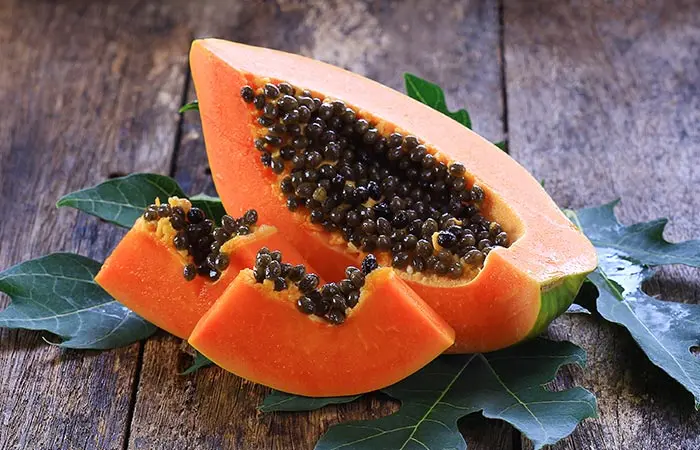
Papaya has uterotonic properties, which means it stimulates contraction of the uterus. A study published in the Journal of Ethnopharmacology looked at how papaya latex extract (PLE) affects uterine contractions in animals at different stages of their reproductive cycle and pregnancy. The researchers found that PLE increased uterine contractions, especially during the proestrus and estrus stages and late pregnancy, when estrogen levels are higher. The contractions became stronger with higher doses of PLE. The study concluded that PLE contains a mix of compounds, like enzymes and alkaloids, that can cause strong and lasting uterine contractions (1). This may help in inducing your period early. However, there is no scientific evidence to back this claim.
You Will Need
- 1 ripe papaya
What You Have To Do
- Cut the ripe papaya and consume it directly.
- Alternatively, you can blend the fruit and prepare fruit juice for consumption.
How Often You Should Do This
Drink this juice once daily in the days leading up to your period.
Note: Some individuals may experience gastrointestinal distress or allergic responses when consuming papaya. Always seek medical advice before trying any new treatments or remedies.
2. Vitamin C
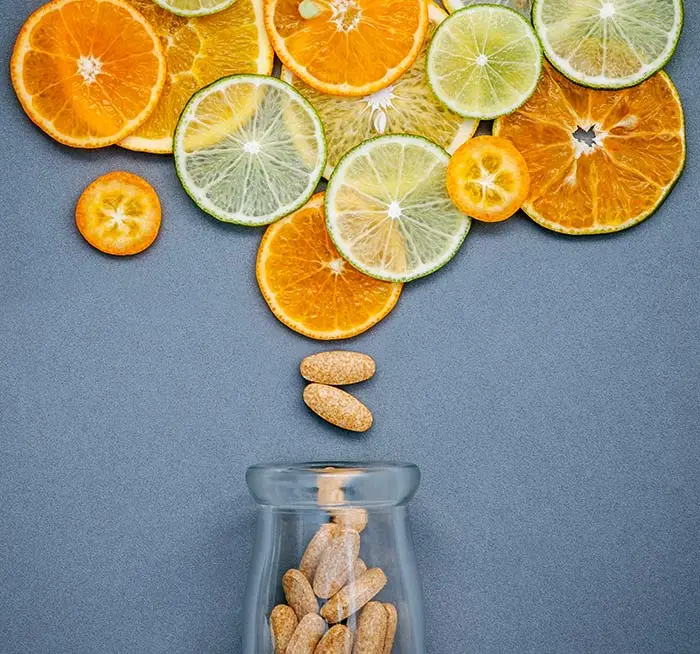
If you are wondering how to get periods early, we present one of the best choices – Vitamin C or ascorbic acid. It can increase estrogen levels in your body. A study published in Climacteric investigated the effects of vitamin C on blood vessel function in postmenopausal women with low estrogen levels, which can increase heart disease risk. Researchers measured forearm blood flow (FBF) in 18 women (some on estrogen therapy, some not) before and after receiving 1.5 g of vitamin C intravenously. Results showed that vitamin C significantly improved blood flow in estrogen-deficient women, while those on estrogen therapy showed a smaller improvement (2). Estrogen regulates your menstrual cycle. Vitamin C can decrease progesterone levels in your body, which results in premature shedding of the uterine lining and may cause an early period.
Caution: You must take supplements in the dosage as prescribed by your doctor as overdose can lead to dangerous side effects.
A blogger, facing a delayed menstrual cycle, attempted to induce her period using high doses of Vitamin C. She consumed 4,000mg on the first day and 6,000mg on the second. She experienced symptoms like tender nipples, migraines, back pain, and abdominal discomfort. She noted on the 5th day of the dose, “I was kind of losing hope cause before this day I also felt being wet. The wet feeling as if you’re ovulating and your underwear just keeps on being wet even with liners. So when I felt the ‘slushy’ feeling as if a uterus lining passes through the cervix I doubted it and checked later. Luckily, I did check, and I had [a] light blood stain (this was about 3PM) (i).”
3. Pineapple
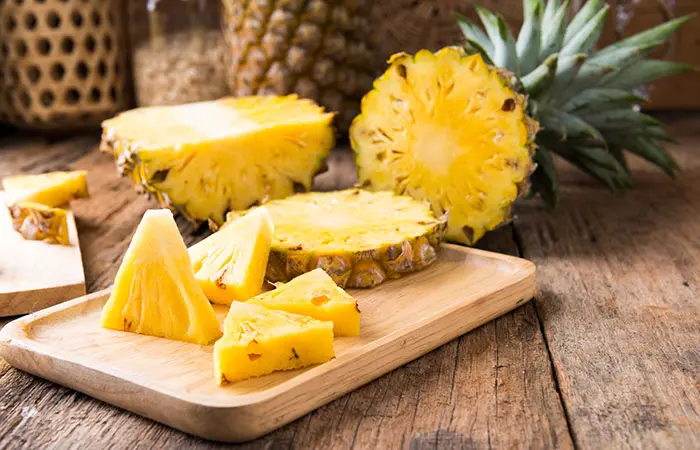
Pineapples are a great option if you are looking for tips on how to bring on periods early. Pineapples have uterotonic properties and can induce uterine contractions in women (3). This helps facilitate the shedding of the uterine lining and causes your period to come faster. However, it is important to note that there is no scientific research suggesting that pineapples can induce an early period.
You Will Need
- 1 bowl of pineapples
What You Have To Do
- Have a bowlful of pineapples before your period.
How Often You Should Do This
Have it once a day as you near your period.
4. Carrots
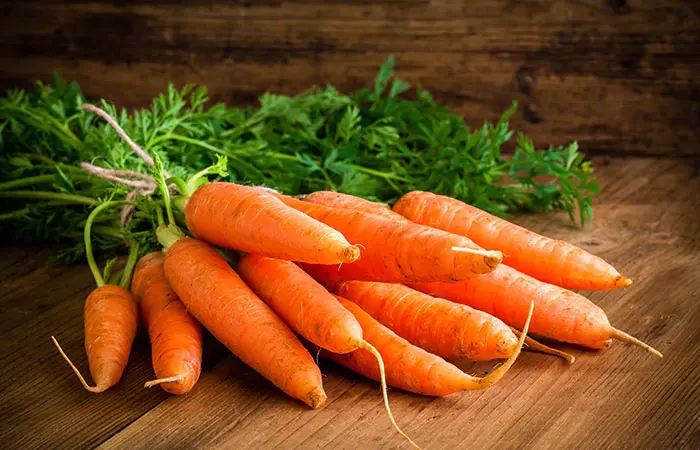
Carrots are one of the best foods to get periods early as they contain beta-carotene and other bioactive compounds that can help you get an early period by inducing the shedding of your uterine lining (4). However, there is lack of scientific evidence to back this up.
You Will Need
- A bowl of fresh carrots
What You Have To Do
- Boil the carrots in water and consume directly.
- Alternatively, you can drink carrot juice once or twice a day.
How Often You Should Do This
You can follow this remedy1-2 times daily as you near your period.
5. Fennel Seeds
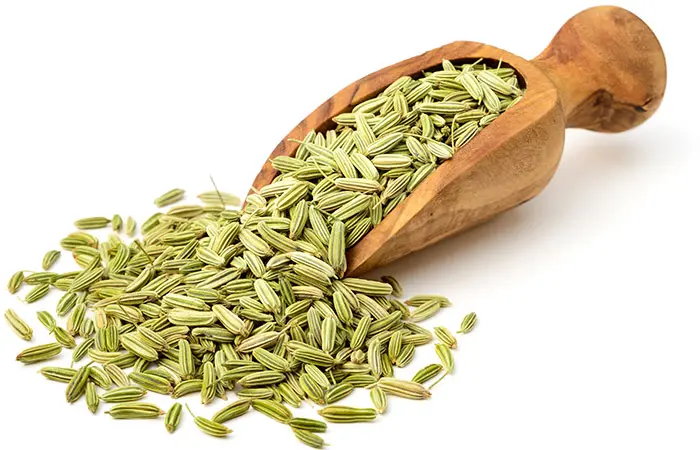
Have you been scouring through the internet searching for tips on how to get early periods? Fennel seed extract is the perfect choice! It can function as an emmenagogue (5), (6). This means that it may increase the flow of blood from the uterus, thus inducing an early period. More research is needed to establish fennel seeds as an effective remedy to induce a period.
You Will Need
- 2-3 cups of boiled water
- 1 tablespoon of fennel seeds
What You Have To Do
- Boil water in a saucepan.
- To this, add fennel seeds and let it simmer.
- Drink this solution after straining.
How Often You Should Do This
You can follow this remedy at regular intervals in the day.
6. Pomegranate
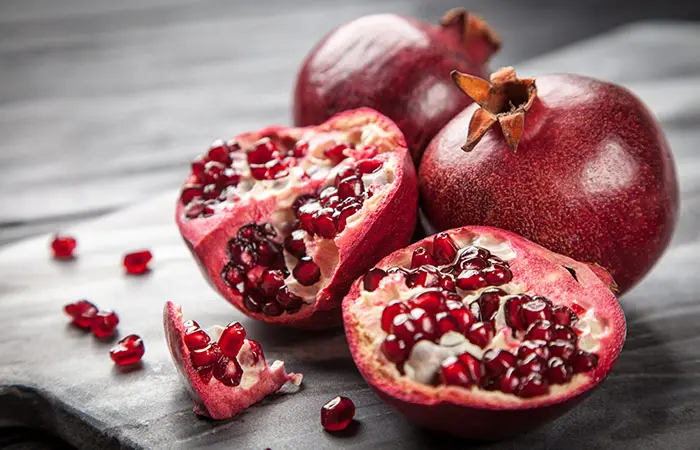
Pomegranates can regulate the phasic activity of the menstrual cycle, thereby ensuring a regular period (7). Their estrogenic activity may help in inducing an early period. But this remedy lacks scientific backing.
You Will Need
- A bowl of pomegranate that is peeled
What You Have To Do
- You can add pomegranate to your daily diet.
How Often You Should Do This
You can follow this remedyonce daily before your period date.
7. Turmeric
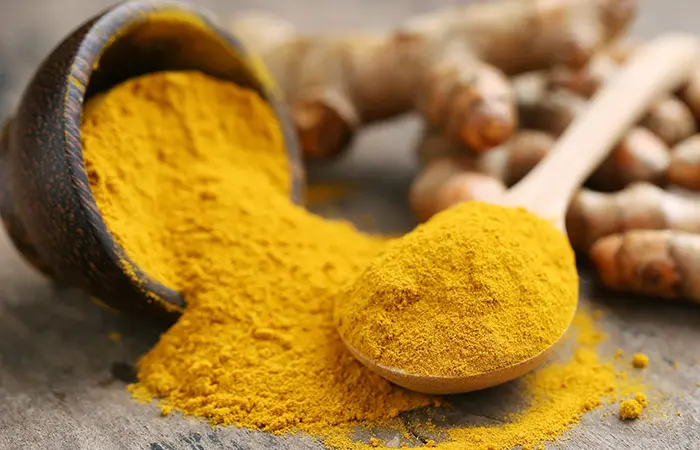
Turmeric is one of the best home remedies to get periods. It contains a bioactive compound called curcumin that works as an emmenagogue (8). It may help you get your period faster by stimulating the blood flow to your uterus. However, there is no scientific research to establish this.
You Will Need
- A glass of boiled water
- 1 teaspoon turmeric powder
What You Have To Do
- Boil a glass of water and mix a teaspoon of turmeric powder in it.
- Consume when warm.
How Often You Should Do This
You can follow this remedy 1-2 times daily about 1 week before your period date.
8. Parsley Leaves
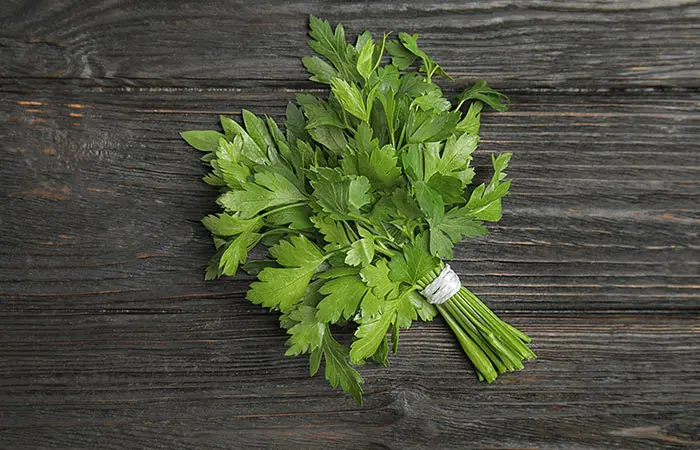
Parsley is the answer to the question ‘how to get periods fast’? It is a rich source of bioactive compounds that may increase the estrogenic activity in your body. It is also an excellent antispasmodic agent that can reduce the pain due to uterine contractions during an early period (9).
You Will Need
- Parsley leaves
What You Have To Do
- Steep a few parsley leaves in boiling water.
- Strain this and dry the leaves.
- Consume the dried parsley leaves three times daily.
How Often You Should Do This
You can follow this a week or 10 days before your period.
9. Coffee

Caffeine is the best pick if you are looking for how to get periods faster. It is the major component of coffee. It is known to exhibit properties that stimulate estrogenic activity (10). However, there is lack of scientific evidence that states that caffeine can help in inducing a period.
You Will Need
- 1 cup of brewed coffee
What You Have To Do
- Consume coffee as regularly as twice a day when you near your period.
How Often You Should Do This
Have slightly more coffee than you usually would until you get your period. And this is how to get your periods early.
Caution: Do not consume excess coffee after your period due to the high content of caffeine.
10. Castor Oil
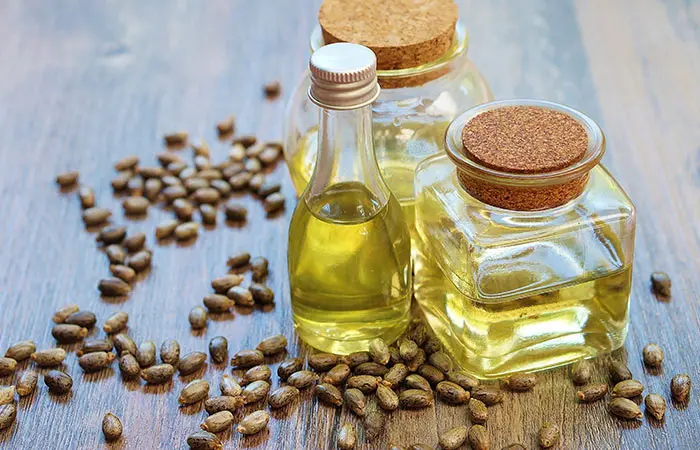
Wondering how to make your periods come faster? You can use castor oil! Ricinoleic acid is a major component of castor oil. It is known to induce uterine contractions (11). This, in turn, may induce an early period.
You Will Need
- Warm compress
- 1/2 tablespoon of castor oil
What You Have To Do
- Gently massage some castor oil onto your lower abdomen.
- Use a warm compress on your lower abdomen
- Leave it on for 15-20 minutes.
How Often You Should Do This
You can do this two times daily a week before your period. And this is how to induce periods early.
11. Ginger
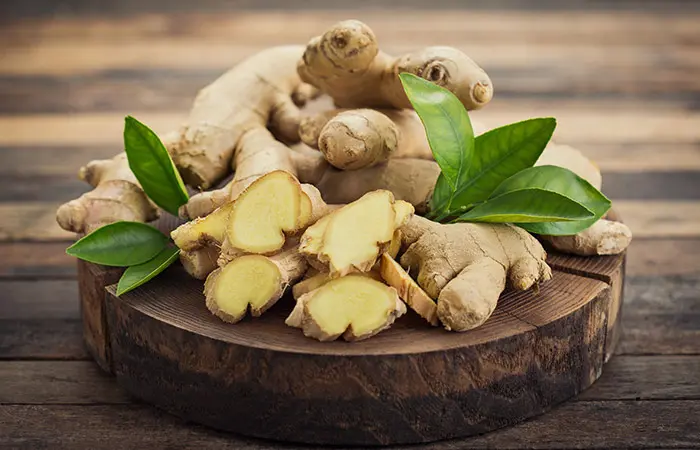
Try ginger if you want to know how to get your period faster. It is rich in bioactive compounds that can increase body heat and induce an early period (12). It is also an effective remedy for relieving period cramps. It exhibits antispasmodic properties that help alleviate menstrual symptoms like abdominal cramps (13). So, if you have been wondering how to get rid of period cramps, congratulations! Because you don’t have to endure the pain and discomfort anymore.
You Will Need
- 1/2 tablespoon of ginger juice
- Honey
What You Have To Do
- Crush ginger to extract its juice.
- Add some honey to this juice and consume daily.
How Often You Should Do This
Follow this remedy two times daily a few days before your actual period date.
12. Sesame Seeds
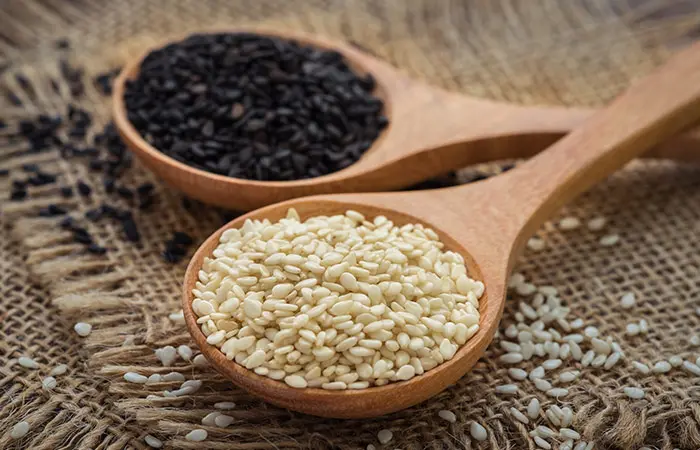
Sesame seeds contain bioactive compounds that can induce and regularize menstrual flow (14). Hence, consumption of sesame seeds may cause an early period.
You Will Need
- 1 teaspoon of sesame seeds
What You Have To Do
Consume a teaspoon of sesame seeds with honey.
How Often You Should Do This
You can follow this two times daily for about two weeks before your period. And this is how to get periods immediately.
Lifestyle changes, hormonal fluctuations, menopause, stress, activity levels, inadequate nutrition, and certain underlying medical conditions can make your menstrual cycle fluctuate, resulting in early or delayed periods. However, there may be certain instances where you may want to get your period early. In that case, you may apply certain home remedies that can induce periods. Papaya juice, vitamin C intake, pineapples, parsley, pomegranate, fennel seeds, and turmeric are some of the natural ingredients that can aid in stimulating the menstrual cycle. You may need to follow these remedies for a week or so before you get your periods, so planning and getting an early start may help prepone your periods.
Infographic: Home Remedies For Menstrual Cramps
Abdominal cramps or menstrual cramps can be a real villain during your period days. You may experience pain in the lower abdomen, stomach, upper legs, or lower back. Most women experience period pain during their menstrual cycle, which may affect their daily activities. However, there are home remedies that help reduce the pain.
Check out the infographic below for some remedies to help relieve menstrual cramps. Illustration: StyleCraze Design Team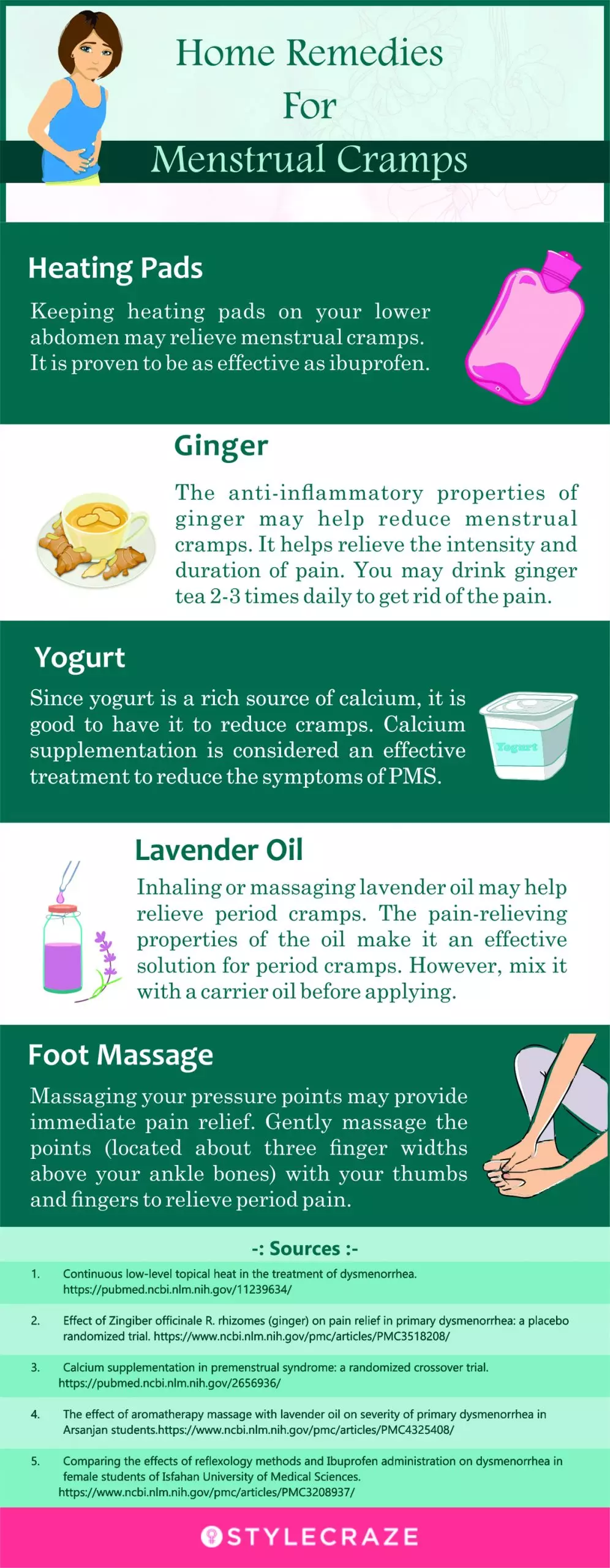
Frequently Asked Questions
Can stress delay my period?
Yes, stress can delay your period. Excessive stress may upset your body’s hormonal balance, disturbing your menstrual cycle. You should learn how to effectively manage stress through meditation, laughter therapy, journaling, and other possible options.
Is it safe to induce my period?
While it is safe to induce periods through natural methods you should exercise caution. It is advisable to consult with a healthcare provider to make sure taking supplements or medication to start your period is appropriate for your health.
How does lemon shorten your period?
Yes, anecdotal evidence suggests that lemon is a home remedy that may help stop your period early. Dr. Kimberly Langdon, an obstetrician/gynecologist, says, “Citrus fruits, such as lemon, contain flavonoids, which are known to regulate menstruation by reducing the intensity and duration of bleeding. Furthermore, they alleviate dysmenorrhea (menstrual pain) by acting on inflammatory mediators, reducing uterine cramps.”
Can drinking water shorten your period?
According to Dr. Langdon, “Hydration is essential when you have your period. Water deficiency activates AVP, a uterine substance that mediates muscle cramps, and drinking at least eight glasses of water daily helps to reduce cramping and menstrual duration.”
Do you pee a lot when your period is coming?
“During menstruation, the hormone progesterone irritates the muscle that lines the bladder, causing frequent urination and urinary incontinence (involuntary loss of urine). For this reason, pelvic floor exercises, such as Kegel exercises, are advised to help reduce the severity of menstruation-related urinary incontinence,” says Dr. Langdon.
What are the exercises to get periods immediately?
If you are wondering what to do for early periods. Exercise is your answer! You can try exercise to get periods immediately. Try abdominal exercises like crunches, squats, pelvic twists, etc. to induce an early period. However, there are no studies to prove that these exercises induce periods.
What to eat if you don’t get your period?
Consume foods rich in vitamins and other essential nutrients. Ginger, cinnamon, dates, and sesame seeds are what to eat to get periods.
Why did I get my period twice?
Your menstrual cycle is usually 21-35 days long. If you have a shorter cycle, the chances are that you can get your period twice a month, but if you experience bleeding outside of this cycle, it could be due to conditions like cysts, fibroidi Non-cancerous growths that are made of the muscle and connective tissue of the uterus during the childbearing years of a woman. or even stress.
How likely are you to get pregnant right after your period?
Right after your period, your chances of getting pregnant are relatively lower. However, if you ovulate early after your period, you are more likely to get pregnant if you do not use a contraceptive.
When does your period begin again after an abortion?
An abortion can start a fresh cycle of your period. You can expect to be on your period about 4-8 weeks after undergoing an abortion.
How can you get periods early to avoid pregnancy?
For this, you can take birth control pills prescribed by your doctor. Alternatively, you could try any of the remedies mentioned above to get an early period.
What foods make your period heavier?
Beetroots, honey, coffee, dairy products, and chocolates may trigger blood flow and make your period heavier.
How long is normal for the late period?
You can consider your period late if you have had no menstrual flow for 6 weeks or more.
Does eating ice cream make your period worse?
Yes. Intake of sugary foods like chocolates, ice creams, and sweets may make your period worse (15).
Can lack of sleep cause late periods?
Yes. Lack of sleep can cause late periods. Sleep disturbance and decreased melatonin secretions can cause hormonal disturbances that result in late periods (16).
Illustration: How To Get Your Period Early - 12 Natural Ways To Induce It
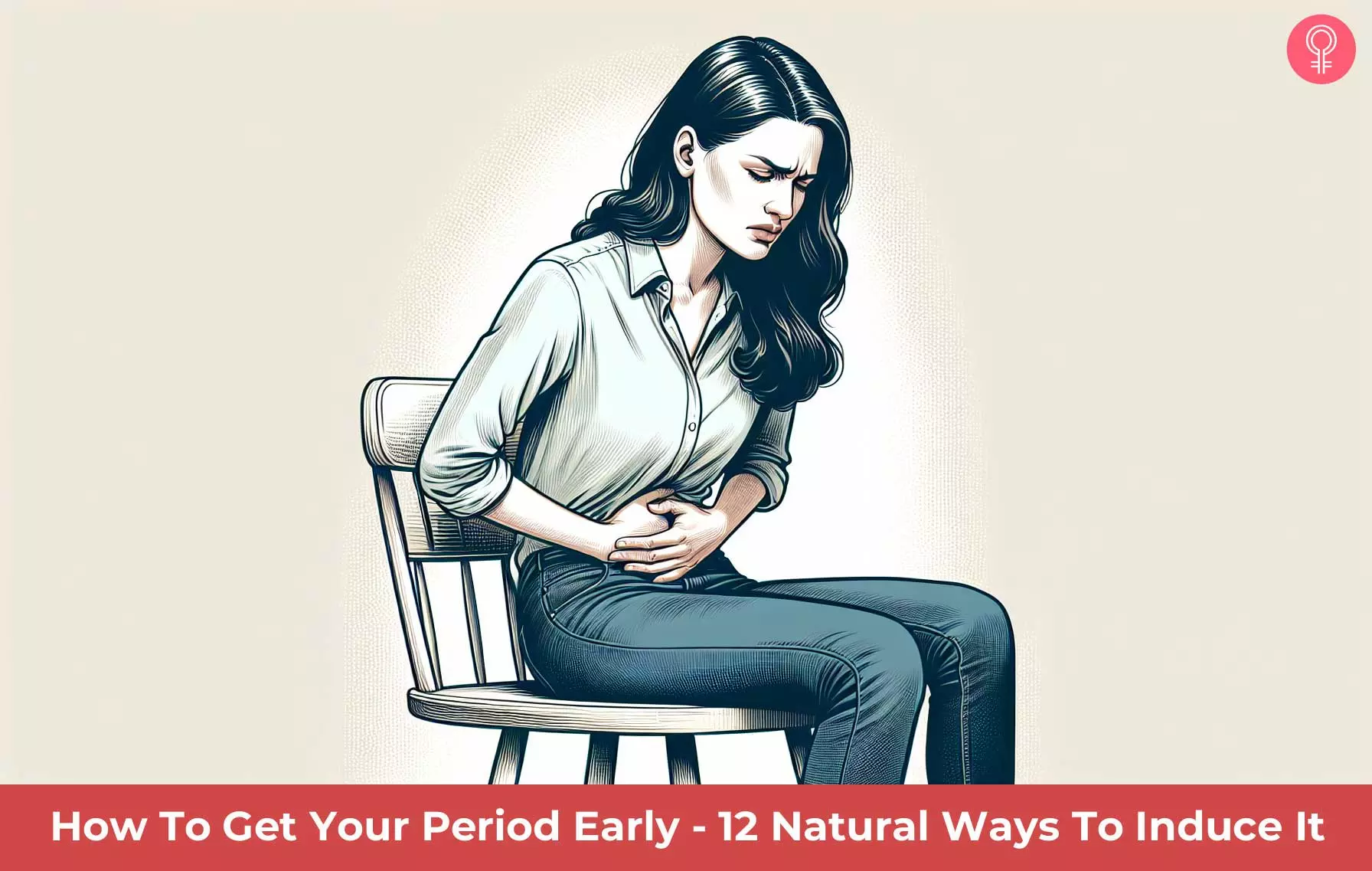
Image: Dall·E/StyleCraze Design Team
Want to know how to get your period faster? Check out this video to learn about simple techniques that can help reduce your menstrual cycle length and ease the accompanying discomfort.
Personal Experience: Source
StyleCraze's articles are interwoven with authentic personal narratives that provide depth and resonance to our content. Below are the sources of the personal accounts referenced in this article.
i. Vitamin c overdose and inducing periods: a testimonialhttps://qouwre72.wordpress.com/2016/12/01/vitamin-c-overdose-and-inducing-periods-a/
References
Articles on StyleCraze are backed by verified information from peer-reviewed and academic research papers, reputed organizations, research institutions, and medical associations to ensure accuracy and relevance. Read our editorial policy to learn more.
- “Effect of papaya latex extract on gravid and non-gravid rat uterine preparations in vitro.” Journal of Ethnopharmacology, US National Library of Medicine, National Institutes of Health.
- “Vitamin C improves endothelial function in healthy estrogen-deficient postmenopausal women.” The Journal of the International Menopause Society, US National Library of Medicine, National Institutes of Health.
- “Investigation of uterotonic properties of Ananas comosus extracts.” Journal of Ethnopharmacology, US National Library of Medicine, National Institutes of Health.
- “Effect of menstrual cycle phase on the concentration of individual carotenoids in lipoproteins of premenopausal women: a controlled dietary study.” The American Journal of Clinical Nutrition, US National Library of Medicine, National Institutes of Health.
- “Foeniculum vulgare Mill: A Review of Its Botany, Phytochemistry, Pharmacology, Contemporary Application, and Toxicology” BioMed Research International, US National Library of Medicine, National Institutes of Health.
- “The effect of fennel essential oil on uterine contraction as a model for dysmenorrhea, pharmacology and toxicology study.” Journal of Ethnopharmacology, US National Library of Medicine, National Institutes of Health.
- “Potent health effects of pomegranate” Advanced Biomedical Research, US National Library of Medicine, National Institutes of Health.
- “Curcumin Stimulates the Antioxidant Mechanisms in Mouse Skin Exposed to Fractionated γ-Irradiation” MDPI, US National Library of Medicine, National Institutes of Health.
- “Parsley: a review of ethnopharmacology, phytochemistry and biological activities” Journal of Traditional Chinese Medicine, ResearchGate.
- “Studies on the estrogenic activity of a coffee extract.” Journal of Toxicology and Environmental Health, US National Library of Medicine, National Institutes of Health.
- “Castor oil induces laxation and uterus contraction via ricinoleic acid activating prostaglandin EP3 receptors” PNAS, US National Library of Medicine, National Institutes of Health.
- “Hyperthermic Effect of Ginger (Zingiber officinale) Extract-Containing Beverage on Peripheral Skin Surface Temperature in Women” Evidence-Based Complementary and Alternative Medicine, US National Library of Medicine, National Institutes of Health.
- “The study of the antispasmodic effect of Ginger (Zingiber officinale) in vitro” Der Pharmacia Lettre.
- “Herbal Medicine for Oligomenorrhea and Amenorrhea: A Systematic Review of Ancient and Conventional Medicine” BioMed Research International, US National Library of Medicine, National Institutes of Health.
- “Dysmenorrhoea among students aged 18–45 years attending University in Uganda: A cross‐sectional multicenter study of three Universities in Uganda” US National Library of Medicine, National Institutes of Health.
- “Sleep and Premenstrual Syndrome” Journal Of Sleep Medicine And Disorders, US National Library of Medicine, National Institutes of Health.
Read full bio of Dr. Kritika Verma
- Dr. Kimberly Langdon, MD, is a retired university-trained obstetrician/gynecologist with 19 years of clinical experience. Besides obstetrics, she also has expertise in menstrual disorders, vaginitis, infertility, menopause, contraception, pelvic pain, sexually transmitted infections, and minimally-invasive surgeries.
 Dr. Kimberly Langdon, MD, is a retired university-trained obstetrician/gynecologist with 19 years of clinical experience. Besides obstetrics, she also has expertise in menstrual disorders, vaginitis, infertility, menopause, contraception, pelvic pain, sexually transmitted infections, and minimally-invasive surgeries.
Dr. Kimberly Langdon, MD, is a retired university-trained obstetrician/gynecologist with 19 years of clinical experience. Besides obstetrics, she also has expertise in menstrual disorders, vaginitis, infertility, menopause, contraception, pelvic pain, sexually transmitted infections, and minimally-invasive surgeries.
Read full bio of Shaheen Naser
Read full bio of Arshiya Syeda
Read full bio of Dipti Sharma





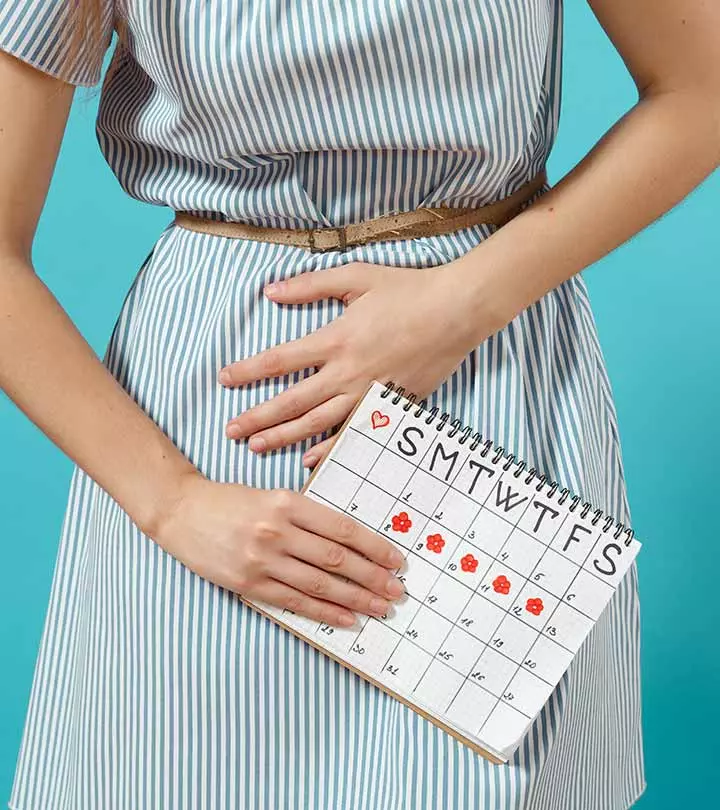
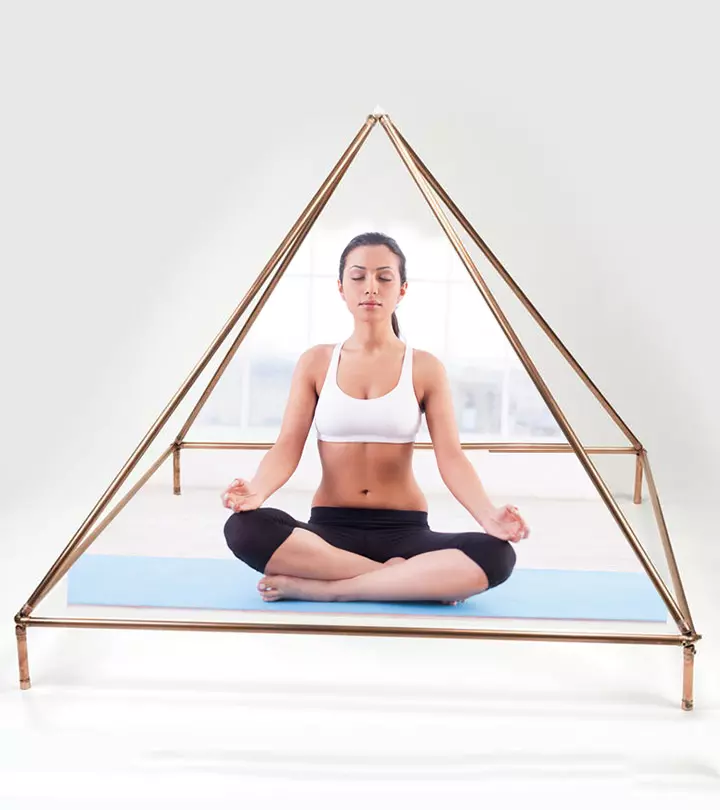
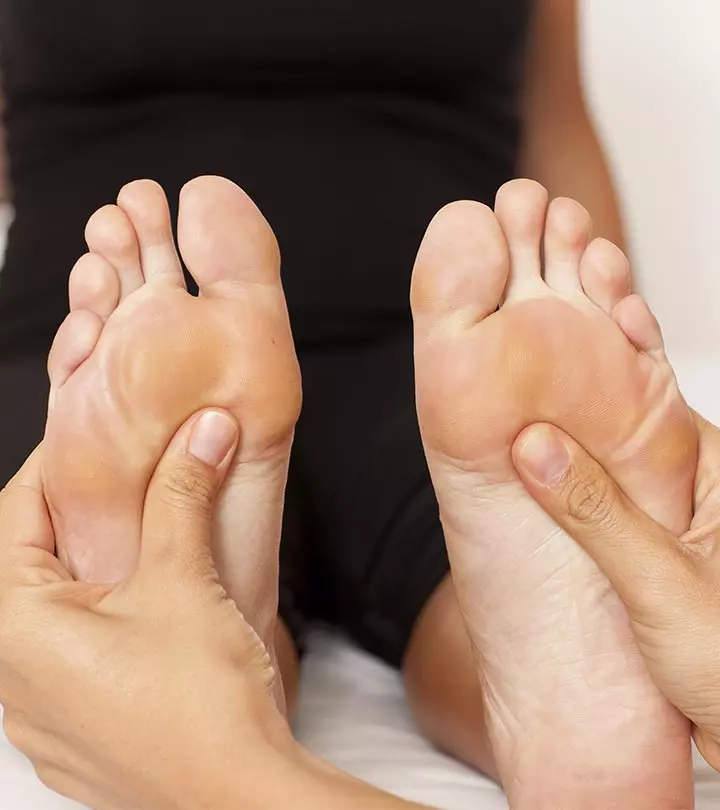

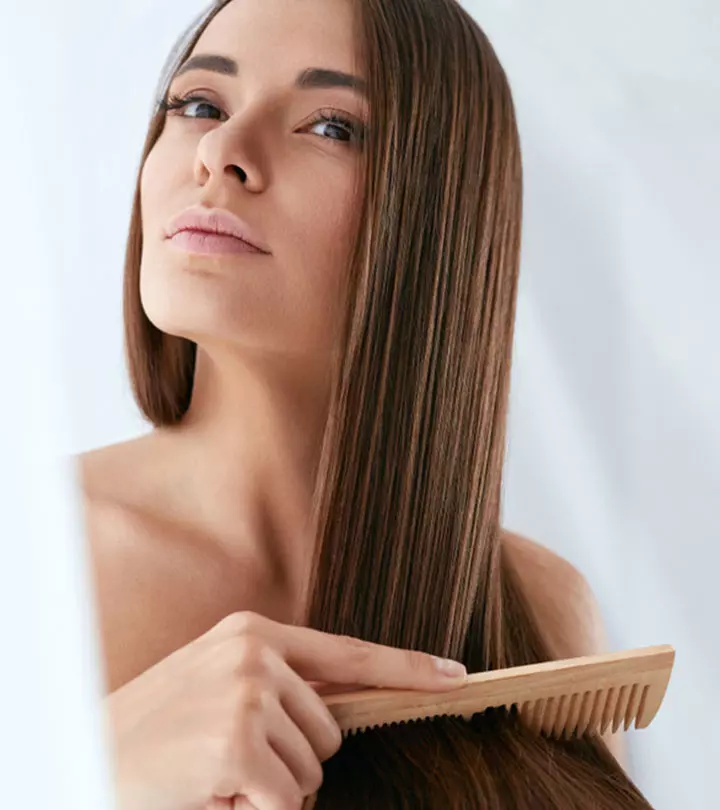

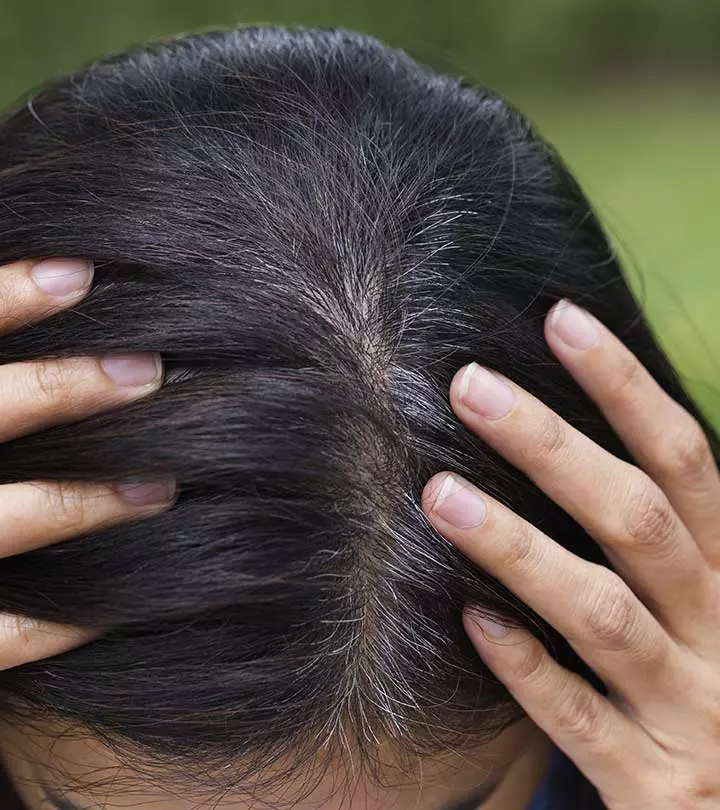
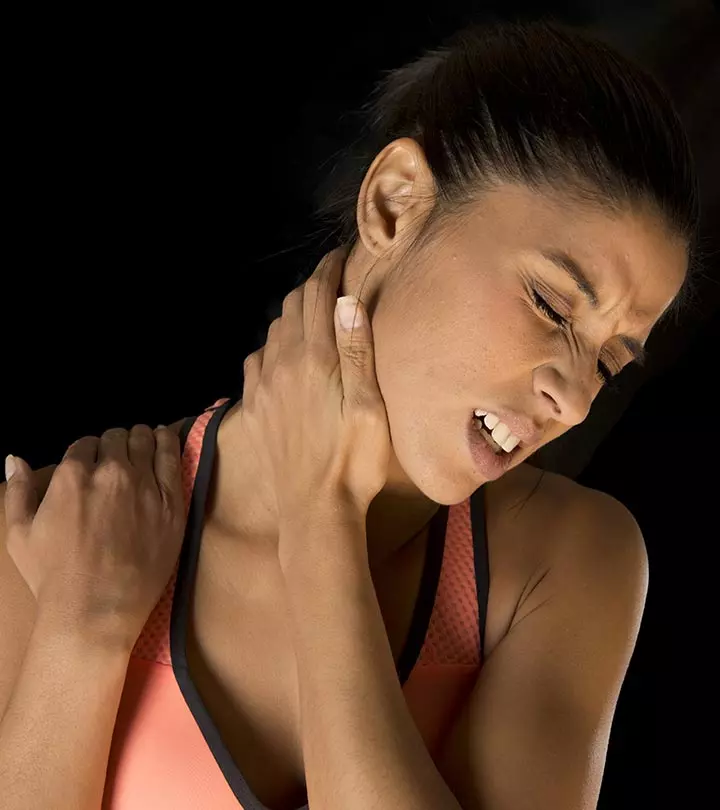
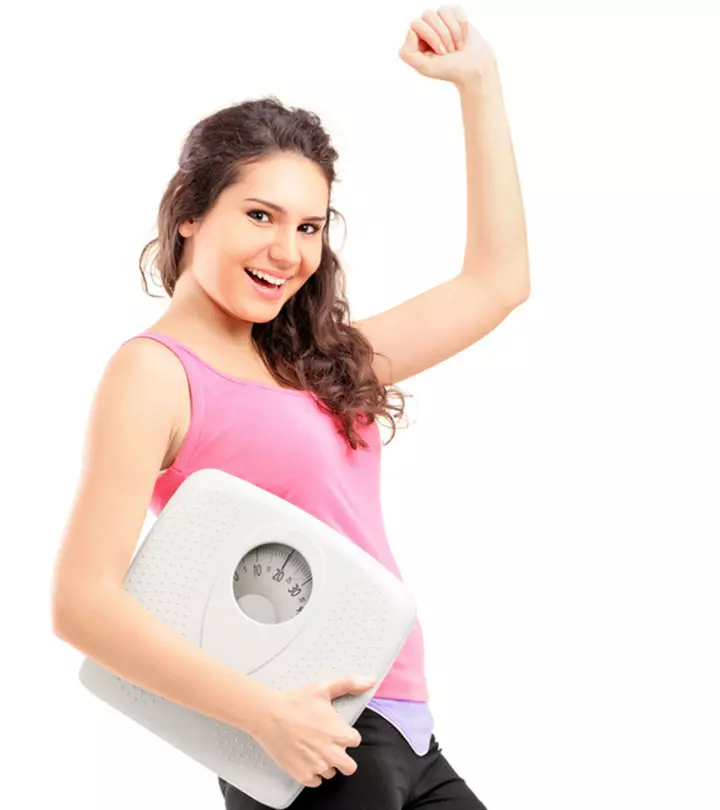
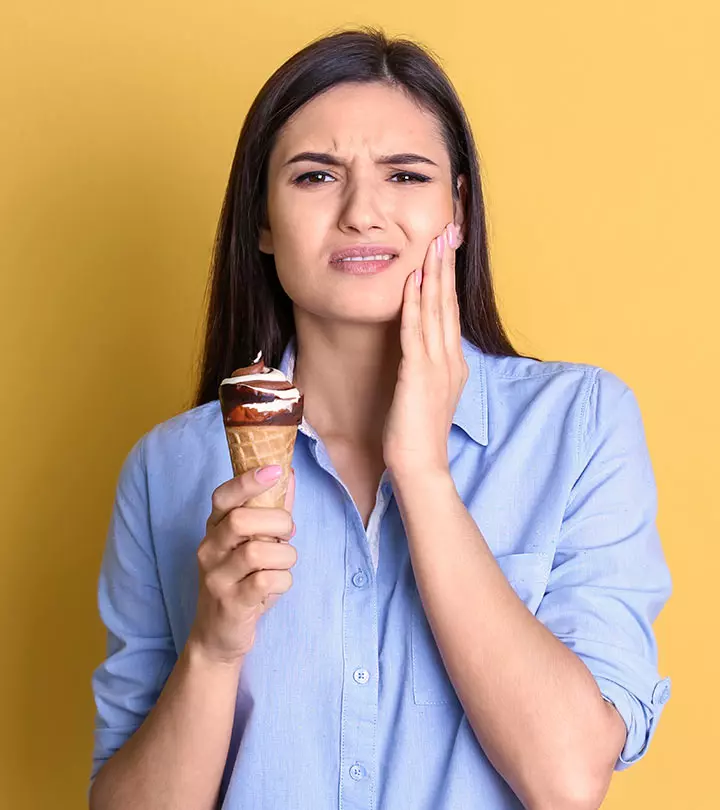
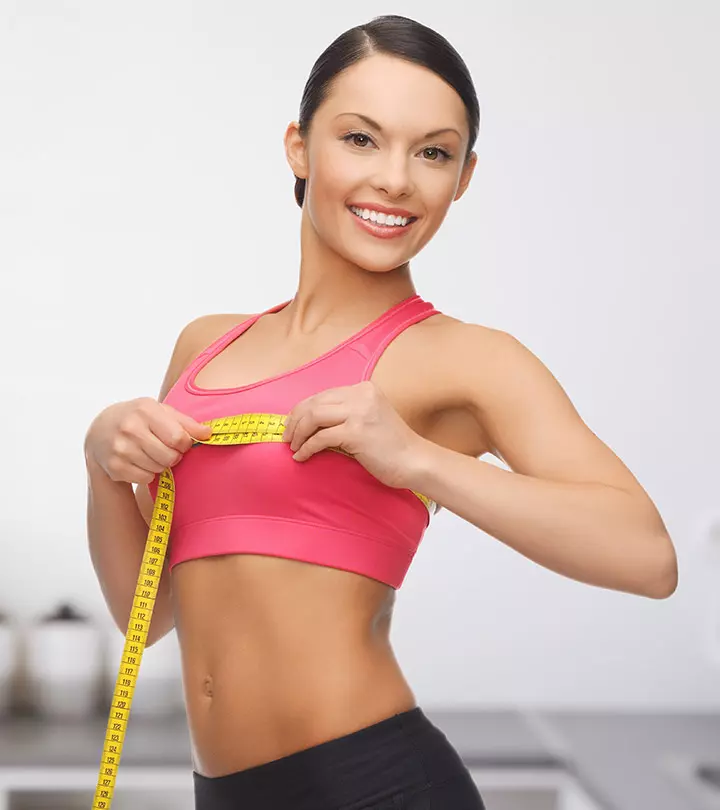

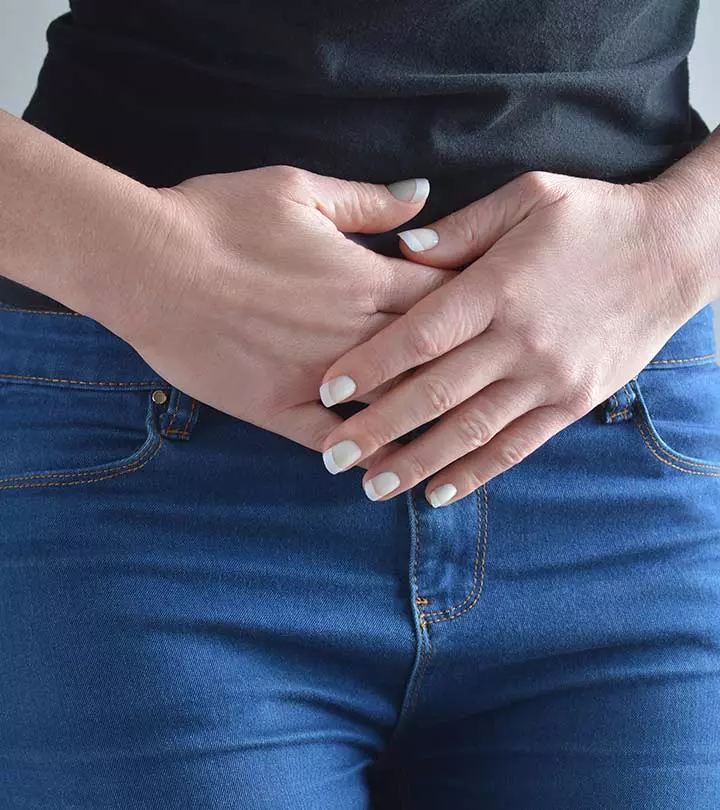

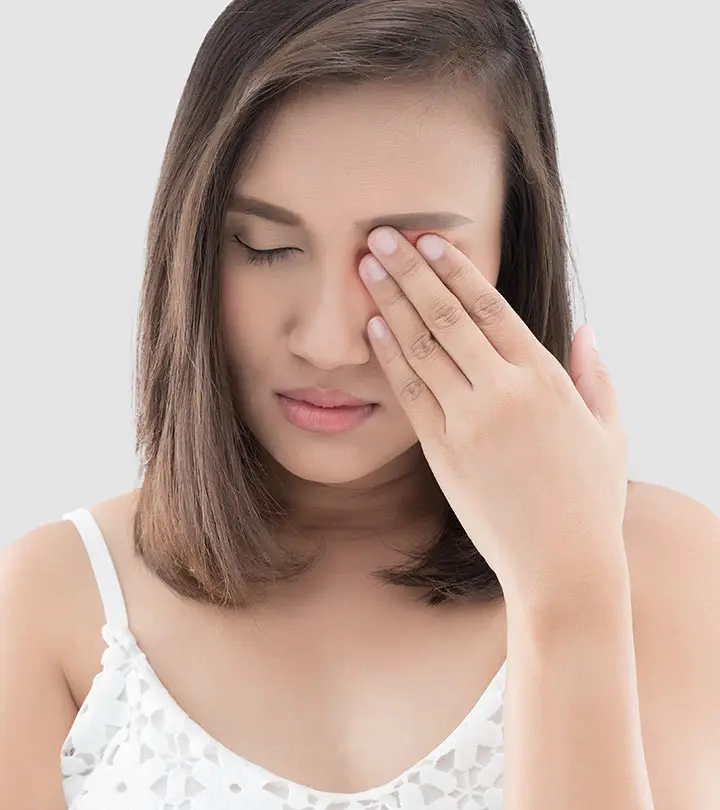
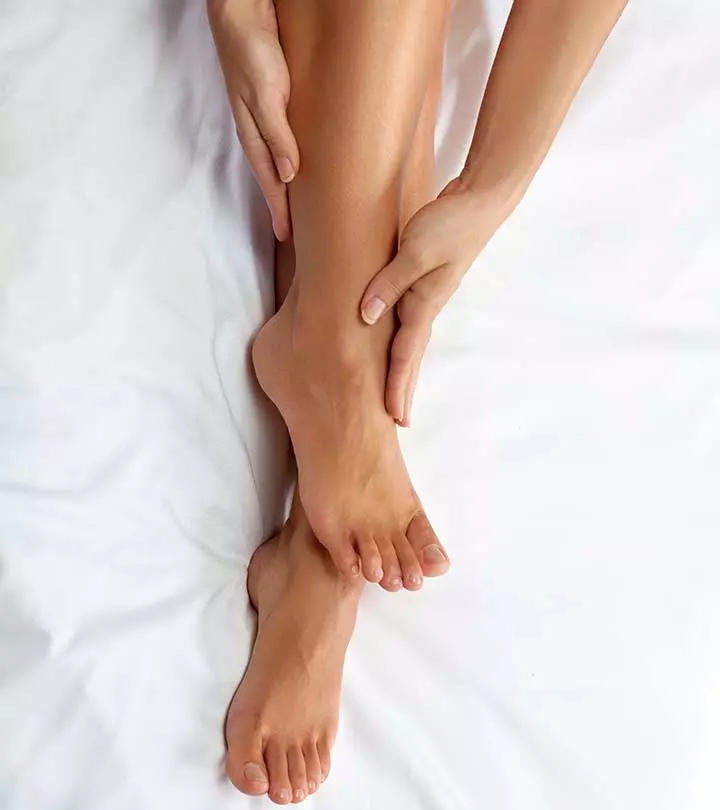
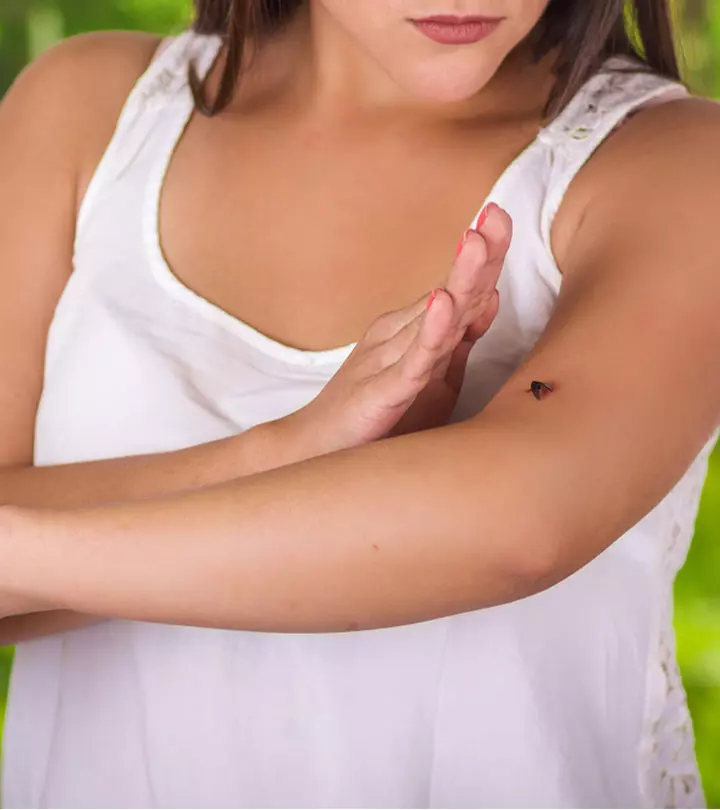
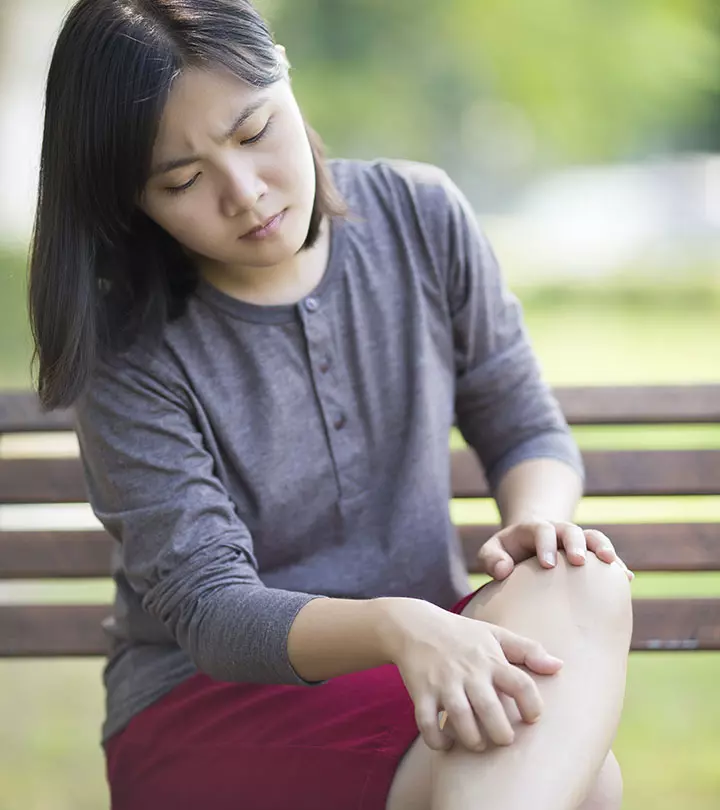
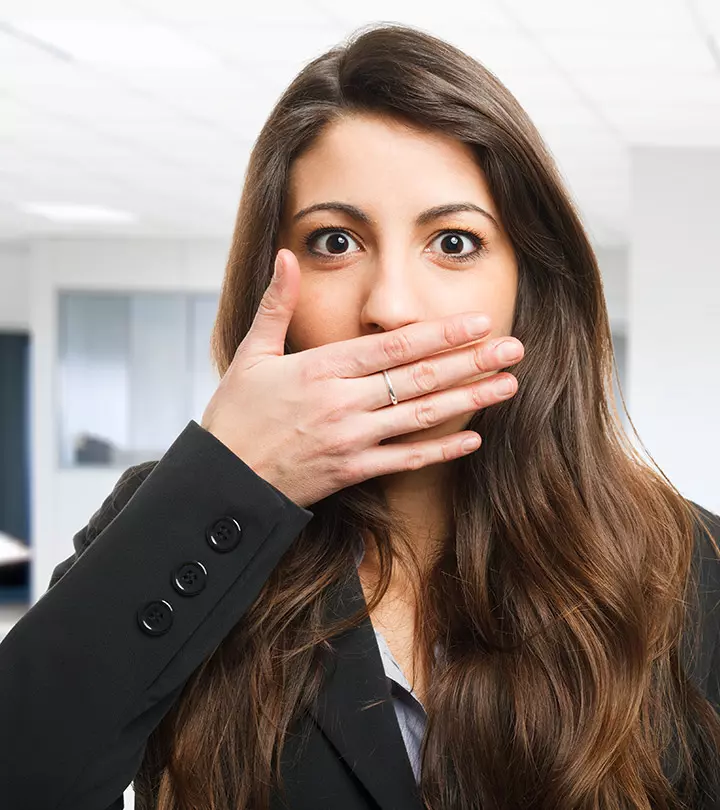
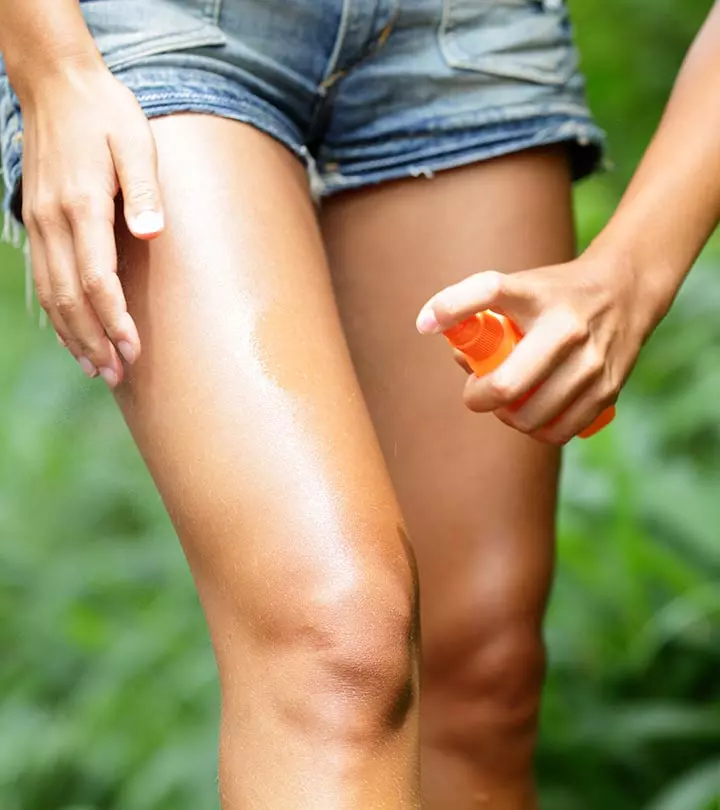
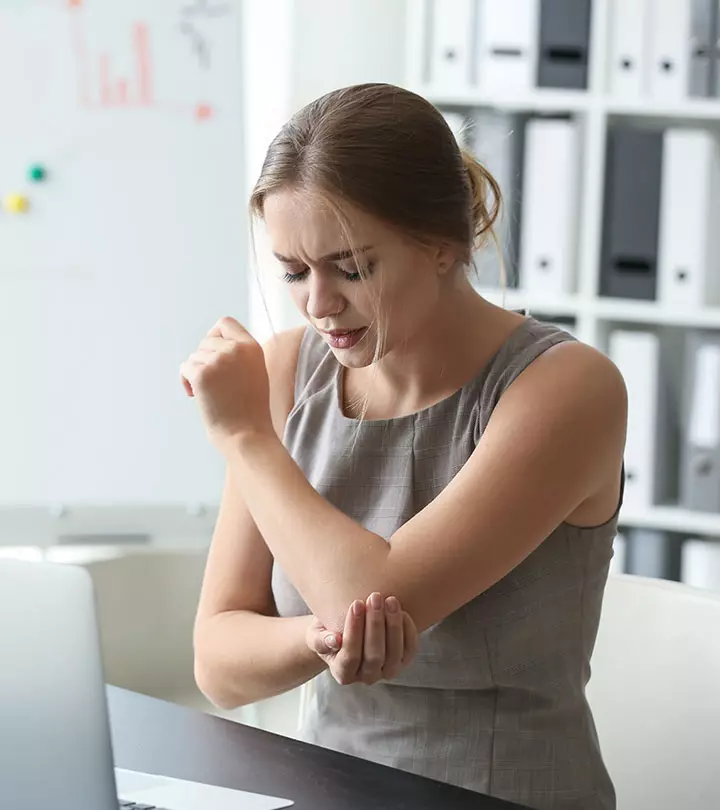
Community Experiences
Join the conversation and become a part of our empowering community! Share your stories, experiences, and insights to connect with other beauty, lifestyle, and health enthusiasts.